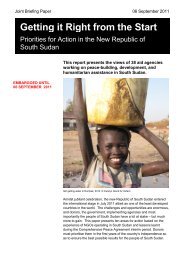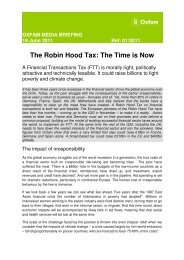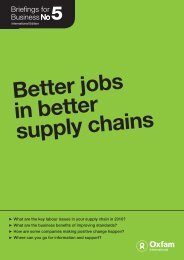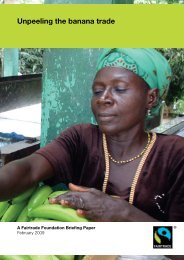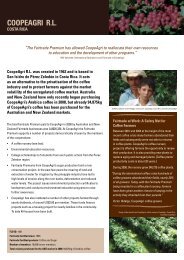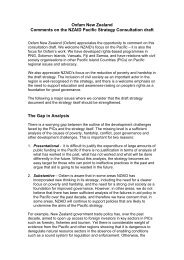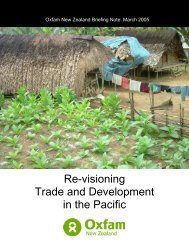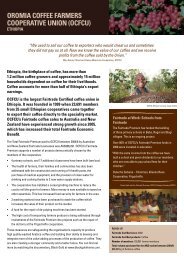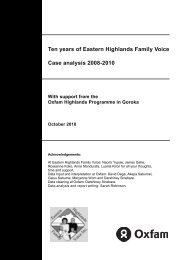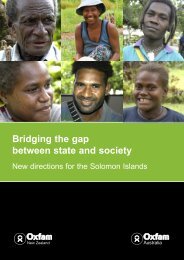Better returns for business.pdf - Oxfam New Zealand
Better returns for business.pdf - Oxfam New Zealand
Better returns for business.pdf - Oxfam New Zealand
- No tags were found...
You also want an ePaper? Increase the reach of your titles
YUMPU automatically turns print PDFs into web optimized ePapers that Google loves.
ELEVENWhile the debates around access to water andagricultural land offer the clearest examples ofthe risks faced by investors, a similar pictureemerges in other areas. For example, emergingeconomies are expected to provide 50 per centof the future pharmaceutical market growthby 2020, 12 This has <strong>for</strong>ced pharmaceuticalcompanies to consider how they can adapttheir <strong>business</strong> models to address the pricing,research and development, and intellectualproperty issues that impact on access tomedicines in order to protect their long-termshare value. 13PENSION FUNDS AND FUND MANAGERSTHEMSELVES, AS WELL AS THECOMPANIES IN WHICH THEY INVEST, HAVESTARTED TO BECOME THE TARGET OFCIVIL SOCIETY CAMPAIGNS.Bribery and corruption is another major issue <strong>for</strong>investors, which potentially affect all sectors ofthe economy. In the BRBW workshop on briberyand corruption, 14 participants expressed concernabout the mounting hidden cost of corruptioninvestigations. The direct financial cost ofone case study presented in the workshopwas calculated at $293 million; this was inaddition to the unquantifiable costs associatedwith reputation damage and managementdistraction. 15Growing social and regulatory pressureApart from the financial case <strong>for</strong> action,investors are facing increasing scrutiny andpressure from governments, media and civilsociety as a result of the growing expectationsof investors to be transparent and accountable<strong>for</strong> their social and environmental impacts.Perhaps the most high profile example inrecent years has been the campaign <strong>for</strong> theinternational prohibition of cluster munitions,which has seen investors being explicitlytargeted. These campaigns have beenparticularly successful in the Netherlands andScandinavia where pension funds were directlytargeted. An increasing number of investorsnow have explicit prohibitions on investing incompanies involved in the production of clustermunitions: <strong>for</strong> example, UBS Global AssetManagement, 16 Norway Pension Fund and the<strong>New</strong> <strong>Zealand</strong> Superannuation Fund, Belgianbank KBC, Dutch bank ING, Dutch Pensionfunds PGGM and ABP.Beyond specific NGO campaigns, there is moregeneral pressure <strong>for</strong> institutional investorsto take a more responsible approach to themanner in which they conduct their investmentactivities, and these pressures are likely to growover time. Pension funds and fund managersthemselves, as well as the companies inwhich they invest, have started to become thetarget of civil society campaigns. For example,FairPensions 17 in the UK and VBDO 18 in theNetherlands both benchmark pension fundsand fund managers on their per<strong>for</strong>mancein managing environmental, social andgovernance issues, and publish the names ofgood and poor per<strong>for</strong>mers.“What has changed is thatstraight<strong>for</strong>ward legal complianceis no longer sufficient. Societal,market and investor expectations aremuch higher and are continuing torise. The companies that will be thewinners of the future will be thosethat can anticipate and exceed theseexpectations”. Nick Robins, Headof Climate Change Centre, HSBC



